Here is the view from the road that winds through the mountains below the center.
And here’s the front of the center.
Here’s what it looks like inside.
Here is the view from the road that winds through the mountains below the center.
And here’s the front of the center.
Here’s what it looks like inside.
Vunet Jean is seventeen. He’s from Lower Koladè, a small, extremely rural area of the Central Plateau. Koladè itself is small and rural, about an hour’s drive over a bad section of Route 3 that heads north out of Ench. Lower Koladè is a modest walk to the west, a walk down a hill, off the highway.
Vunet came to Pòtoprens with his aunt, Jidit, the mother of my godson, Givens. She spent a month in the countryside with her boys this summer, wanting to get away from the city and to make sure her sons come to know both the part of Haiti that they come from and their family. Her father-in-law, Marinot, lives in a house along the main road in Koladè itself, but she spent her time at her own parents’ house, well off the road in nearby Kalifòn.
Jidit is the fourth of her parents’ eight surviving children: seven daughters and a son. Saül, her husband, is one of seven children, so their boys have lots of family to get to know. Vunet is her oldest sister’s oldest son. He would be the oldest child of his generation except that his sister, Vunette, is a few minutes older than he is. They’re twins.
I don’t know how the discussions went that led to Vunet coming to Pòtoprens with his aunt, but I know a couple of things. Vunet had just taken the national primary school graduation exam. He and his sister both had. They had taken it for the second time, having both failed it the previous year. They repeated sixth grade after the failure, the first that either of them had ever experienced, and were waiting for the results. Pass or fail, their parents had decided that they could not pay for more education. They have five younger siblings who need to go to school as well. They arranged to send Vunette to stay with relatives in Tomonn, a small city south of Ench. She was going to learn dressmaking. Vunet would spend the fall with Jidit, and then go to Okap in December. His uncle, Jidit’s one brother, lives there. He’s Vunet’s godfather, and their family decided to send Vunet to live with him. He would try to help young Vunet find work.
It took unusually long for the results of the exam for kids in the Ench region to be published. It was a couple of weeks after al the results for other parts of the country had been published that we learned that Vunet had failed, as had everyone from his school. For that matter, so had all but one of the kids from the other school in Koladè. So Vunet resigned himself to moving on with his life without graduating from sixth grade.
But Jidit was not so ready to let it go at that. She had found over the course of a couple of weeks that she and her children very much like having Vunet around, so she started to think about sending him to school for a third attempt at sixth grade. Her youngest sister, Amiz, had just passed the exam after spending the past year attending a school not far from Jidit’s home. Amiz was in her mid-twenties, and had given up on school years before until she returned with Jidit’s encouragement. Jidit imagined that there was no reason Vunet could not succeed as well.
I don’t know how much schooling Jidit herself had. She can read Creole slowly, and sign her name. She’s able to help her boys with their preschool homework. But she cannot have gotten very far. Nevertheless – or maybe just for that reason – she is devoted to her children’s education and to education for other young people that come under her influence.
So she registered Vunet for school, promising the principal that she’d bring him the documents about Vunet – birth certificate, last year’s report card – as soon as they can be sent in from the countryside. She started going about arranging for Vunet’s uniform and for him books.
In the meantime, she and I decided that Vunet would come up the mountain and spend a weekend with me in Kaglo. We thought he’d enjoy a couple days in the countryside, especially since there’d be boys his own age for him to meet and hang around with. We imagined that, as good as he is with his little cousins, who are six and three, he might need a change of pace. Jidit knew that she could count on Madanm Anténor to welcome him warmly, which is to say that she knew he would not be hungry. Vunet himself was pleased about the plan.
We went up the hill Saturday afternoon, arriving rather late because a heavy rain had stopped us on the way. We went straight to meet Madanm Anténor. I knew that, once she knew he was with me, his weekend would be as good as arranged. We also wanted to talk to Mèt Anténor. As the principal of a public primary school, he knows a lot about the exam and about helping kids pass it. As miserable as the resources available to his school are, a very high percentage of kids always pass. So we wanted to ask his advice.
I was a little puzzled by then. I had spent enough time with Vunet to judge that he is a bright and serious young man. I did some basic math with him because it was something we could do together and I was curious as to his level, and I was impressed with how quickly he caught on to things he had not previously seen. I couldn’t quite figure how he failed the exam not once but twice. After a few minutes questioning, however, Mèt Anténor was able to make the picture very clear.
Most schools in Haiti are private businesses. Their owners’ profits can be affected by anything that affects their reputations, and perhaps nothing could affect a small primary school’s reputation more than the success of its students in the exam. The year Vunet took the exam the first time, his classmates had done poorly. Apparently, the principal tried to dramatically change that, and his effort backfired. The story that Mèt Anténor pieced together suggests that he arranged for his students to cheat, that they were caught, and that the result was disastrous for the kids. This requires some explanation.
The exam papers are centrally graded by teams of teachers whom the government pays to do the job. Answer sheets have neither the student’s name nor the school’s name on them. They are anonymous. But it’s not unusual for a principal to have connections to a teacher who’s grading papers. The principal can have his or her students leave a pre-arranged mark on their answer sheet. The grader sees the mark, and gives the student as high a grade as he or she can. There is a certain amount of leeway in the way points are allotted because partial credit is awarded for answers that are partially correct. So a well-disposed grader can have a big impact on an individual student or on a group of kids from a single school.
If, however, the wrong person – maybe I should rather say the right person – sees that the answer sheets have a suspicious mark on them, a whole school’s pile of answer sheets can be thrown out. Everyone fails. And that is what Mèt Anténor suspects. Vunet himself reported that one of his teachers had been hired to work as part of the correction team and that their principal had taught the kids in their school to mark their sheets a certain way.
So Vunet was instructed by his principal to cheat, and now he is paying the consequences. Though I’m sure he wishes he had passed the exam, he doesn’t seem discouraged, and he seems excited about the chance that Jidit is providing. He also tells me that he likes staying with Jidit, Saül, and their boys. His parents have agreed to postpone any thought of sending him to his uncle in Okap. I suppose that they’re excited about this new opportunity as well. When I asked Vunet what he wants to do when he passes the exam next year – and I very much believe he will – he said he wants to go on to seventh grade. That is still a year away, a long time in the life of a seventeen-year-old boy, but he didn’t show any sign of doubt. Like many Haitians he is excited about any chance for education. I’m excited for him as well.
Here’s a picture of Vunet that I took while he was up in Kaglo.
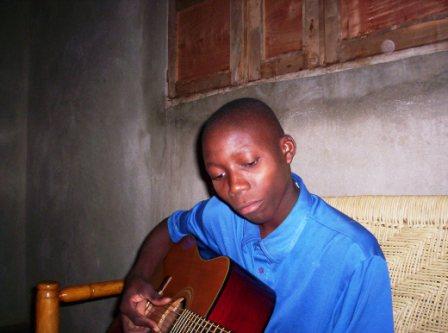
Vunet
This is a story about, in part, how hard it is to accomplish things in Haiti. Despite difficulties of all sorts – logistical, political, economic – Fonkoze is serving over 36,000 clients all over Haiti, and serving them well. It is making plans to serve 200,000 within five years. It is enabling all sorts of poor Haitian women to lift themselves out of poverty.
Mibale is the first major city you come to as you leave the Pòtoprens area on National Route 3, the main inland route into the north. Route 3 leads from the important market in Kwadeboukèt, on the edge of the capital, up and over the mountains that divide the Pòtoprens-area from the Central Plateau. Beyond Mibale is Ench, then Piyon. Eventually, the highway winds into Okap, on the northern coast.
I was only going as far as Mibale. I wanted to spend two days visiting Fonkoze educational programs based at its branch there. We had re-opened educational services in Mibale at the end of May. I had passed through on my way back to Pòtoprens from almost a week of translating for a visitor in early June, but I had gotten sick, so I didn’t get to see anything. This time, I had called Emile, Fonkoze’s coordinator of educational programs for Mibale, and he had planned a schedule of visits that would allow me to see several Basic Literacy classes and several classes on Sexual and Reproductive Health. We would also discuss when Emile wanted to start offering classes in Fonkoze’s third program, Business Development Skills, while I was there.
It was important for me to get to Mibale in the morning because I couldn’t be certain when the classes Emile had scheduled us to visit would meet or how far they would be from his office. He is responsible for educational activities in credit centers that can be almost two hours away by motorcycle.
So I left home early, right at daybreak. I decided to take the back way down the mountain, past Nankonble to Penye, because it would get me to a tap-tap station where I could get a truck straight to Kwadeboukèt. I’d be able to avoid downtown Petyonvil and Delma, so I might save a lot of time sitting in traffic. The part of the trip I’d make on foot is a lot longer than the main route through Mariaman to Malik, and the path isn’t as good, but it’s all downhill. It seemed worth the extra walk.
I was at the station in Penye by 7:00 and in Kwadeboukèt by 7:30. The truck and bus stops for the various destinations on the Central Plateau are crowded along a street by the market. They used to be in downtown Pòtoprens, but moved outside the city a couple of years ago during a period when the violence downtown was especially bad.
There was a pick-up truck waiting when I got to the station, and I stepped right on. It was a small, four-wheel drive with the high clearance that the road through the Central Plateau requires. It has long been a terrible road in places, with deep ruts that fill with mud whenever there’s been rain, steep hills, and large rocks scattered throughout. It took over an hour for the truck to fill up. By the time we were ready to leave, there were 21 of us crowded into the back, five sitting on the cab, fourteen on benches around the sides of the bed, and two on the floor in the middle, plus a considerable amount of luggage.
A lot of work has been done on this road over the last couple of months, so what was a three-four hour drive – less than twenty miles, I think – can now be managed, with some luck, in two. I was in Mibale before 11:00.
Emile was waiting for me at the office. He had arranged for us to visit some centers near Beladè, almost two hours by motorcycle to the east of Mibale. It was Wednesday, which is a market day in Mibale, so none of the nearby centers could meet. The centers we would visit are now served by Fonkoze’s new branch in Beladè, but that branch has no educational programs of its own. We haven’t found the funding. So some of its centers that were formerly served by Mibale still get educational services from there. The first meetings would start at 3:00, so we had just enough time to talk about how things are going and grab a bite to eat before we left.
Communication is hard between Mibale and Beladè. The branch in Beladè is without a phone. In some spots around the Beladè area, Dominican cell phones work, but that means calling Haitian phone numbers is international long-distance. In most of the surrounding mountains, there’s no phone service at all. When we got to the first center just before 3:00, we learned that the meeting day had been switched to Tuesdays. The centers’ teachers hadn’t yet been able to get that message to Emile. We spoke to them about how things were going, and they reported they were pleased. We had come a long way to leave without seeing anything, but, on the whole, Emile was glad of the change. He takes a computer course on Wednesdays, so the Tuesday meetings will be better for him. We had another center to visit, so we had no reason to suspect that the trip would be in vain. We got back on his motorcycle and headed off.
When we got to the second center it was almost 3:30. The center was at a church, about fifty steep feet up a winding path from a road that leads from the main route to Beladè into the mountains around Batis. (See: TheCenterNearBeladè for a couple of pictures.) The closest town is called Paspòm, an odd name that means “my passport.” Emile explained that the name is connected with the proximity to the Dominican border.
The class was scheduled to start at 4:00, but clouds were getting darker and thicker as we waited. Just before 4:00, heavy rains started. The center would not be able to meet that day. We had made the trip for nothing. Or not quite. Shortly after the rain started, the literacy teacher arrived, holding a sheet of plastic over her head. She had come just in case a participant showed up – not very likely, I thought. But she turned out to be right. A few minutes later, a small, fifty-ish woman arrived. She said that she didn’t know whether the class would meet. She herself had just arrived home from a trip to Beladè. But she didn’t like to miss her class, so rain or no rain she decided to show up.
The little shelter that the class meets in has no blackboard. The literacy teacher keeps one at home that she would normally bring to class, but she hadn’t wanted to carry it through the rain. I talked with the participant for a few minutes. Then she and I began an improvised class on the church’s dusty dirt floor. I scratched some letters out with a small rock, and was pleased to see how easily she recognized them. Then she drew a few herself. It seemed as though her progress thus far had been reasonably good. She was, in any case, very excited to be learning to read and write.
Emile and I tried to wait until the rain stop, but though it let up considerably it showed no sign of ending. So we resigned ourselves to getting wet and headed back to Mibale. By the time we arrived, we were thoroughly drenched. It was disappointing to have gotten almost to Beladè and then to have failed to accomplish what we set out to do, but we resigned ourselves, knowing that we’d have another day of center visits before I had to return to Pòtoprens.
Or so we thought. On Thursday, we would be visiting classes closer to Mibale, but they would be meeting earlier. Emile told me that we’d have to be ready to go by 1:00. He’s very conscientious about arriving places on time. It’s an unusual quality in Haiti, but it makes him a good colleague for me.
Late in the morning he got a call from one of his Fonkoze colleagues. The man who called was a credit agent, responsible for disbursing loans and collecting reimbursements. Fonkoze clients do not need to come to a branch to do their banking. Traveling to branches would be both expensive and time-consuming for many of them, so credit agents go to them. This credit agent was in a fix. He had run out of gas while out visiting clients, and was stuck somewhere with lots of cash on his hands. Emile jumped on his motorcycle and rushed off with a gallon of gas in his hand.
I once heard that no good deed goes unpunished. Emile’s good deed certainly didn’t. He was hurrying back to the branch when a dog sped across his path. Before he could react, he had hit the dog and taken a fall. Fortunately, he wasn’t badly injured. Nothing was broken, and he had no deep wounds. But he was scraped up pretty badly. He went to a nearby hospital, where they treated his wounds. I saw him there, and he was more frustrated than hurt. He told me that he felt badly because that meant, once again, that we wouldn’t get to visit centers. I told him not to worry, that I would come again, and that he should just think about healing.
Once I was sure that Emile was alright, I realized that there was no reason for me to spend the night in Mibale. I could save a night’s hotel bill by catching an afternoon bus to Pòtoprens. The vehicles that work these longer routes in the afternoon are, for reasons I don’t understand, less reliable than the ones that work in the morning, but it wasn’t that late just yet, so I decided to try my luck, even though it hadn’t been good so far. I bought a ticket for 75 gourdes, almost two dollars, and got on a big bus that was just about full. My seat was all the way in the back, in the very last row, so I was sure to feel every little bump of the ride, but I wanted to get home, so I took what was available. There was no telling when the next bus would leave.
The return trip took a lot longer than I had hoped. We stopped for over half and hour in Tèwouj. The driver grabbed a wretch, and disappeared under the front of his bus. When we got to Kwadeboukèt it was almost 6:00, and I wasn’t sure whether I’d get home before dark. I had to make a quick choice, either to head to Delma and up through Petyonvil or to take the same shorter route I’d taken down the hill. The shorter route was risky, because I wouldn’t be able to take it after dark. On the other hand, I thought I’d at least be able to make it to the home of Bòs Jacques St. Martin, the father of my friend Elie. Bòs Jacques and his children have been asking me to spend a night with them for a couple of years, so I thought my worst-case scenario would still be pretty good.
Bad decision-making moves as though it obeyed Newton’s laws of motion: Once it gets started it is very much inclined to continue. Deciding to head up through Penye was a bad idea. We were halfway up the road to Penye when the tap-tap I was in was caught in a real downpour. I had my laptop with me, and was sitting in the uncovered area in the back, so I quickly passed my backpack to someone dry and braced myself. I was soaked long before we got to the station, and even when we arrived there was no sign that the rain would stop.
I found an approximately-covered market space and waited for the end of the rain. When it finally did, it was dark, and I decided – once again badly – that I would give up my plan of making it to Bòs Jacque’s house. I’m not sure enough of the way to risk it in the dark. (Elie later pointed out that I could have just called his older brother, who would have cheerfully come to get me.) Instead, I got on another tap-tap, this one headed up Route Frère, to Petyonvil. From there I could walk home along my accustomed route even if it was quite late.
But I had forgotten what heavy rains do to Route Frère. It was badly flooded, almost closed, and the traffic was terrible. The tap-tap made very little progress. Eventually, I lost patience, and decided to walk. Probably another mistake. By this time, it was really dark. I gave up the hope of getting home, and decided just to hike to my godchild’s house. I knew about a back road from Route Frère to the bottom of Delma 75, the street he lives off, but I had never taken it. I didn’t imagine it could be that far.
It is. I had been walking for 45 minutes, and was starting to feel lost. There were no streetlights anywhere, and it was hard to see anything. Finally, I got lucky. A tap-tap drove by, heading to a station down at the bottom of Delma 75. I jumped on. From that station, I’d be able to catch another to the top of the road.
The long day ended well. I had called to say I was on my way, and Jidit, my godson’s mom, was waiting for me. Coffee was ready. By the time I finished a cup of coffee, she was feeding me a plate of rice with a light tomato sauce. For my sister’s sake, I should mention that the sauce was loaded with cashews. She had just received some from her father’s house in the countryside outside of Ench. She and her husband, Saül, couldn’t keep from smiling as they listened to me tell about my trip. There house is small: It’s just one room that they share with their two boys and Jidit’s nephew, Vunet, a seventeen-year-old who came in from the countryside with the cashews. Jidit put me and Vunet on the bed, and she and Saül joined the kids on the floor. She wouldn’t have it any other way.
A couple of years ago, I was at the University of Oldenburg, in northwest Germany, for a conference of people involved in popular education. The conference couldn’t be what I had hoped it would be for me. I had planned to attend with Frémy, my most important Haitian colleague. I would be his translator, and he would be able to talk as a Haitian about popular education in Haiti. But at the last minute, the European Union denied him the visa he needed to attend, so our chance to talk as a team with international colleagues about our work in Haiti disintegrated.
While in Oldenburg, however, I came across some literacy materials that looked interesting. They were produced and displayed by a London-based international NGO, Action Aid, but they were available in French, so before I left the conference I looked into buying a couple of copies.
Some things take time. The book was not available at Borders or on Amazon. In order to get hold of the book, I arranged for a Shimer colleague who was teaching in England at the time to pay for and pick up four copies. He did so, but they stayed in his hands until he returned to Shimer the following year. Shortly thereafter, he passed the books on to me, and I brought them to Haiti.
The book is a how-to manual, designed help teams implement an approach to literacy called “REFLECT.” The name is one of those awkward, forced-sounding acronyms, too ugly to merit repeating. But the approach itself is interesting enough. Rather than using workbooks, or even pre-selected pictures, as the starting-points for lessons in reading and writing, it uses studies that non-readers can make of their own communities. Participants create graphics that organize knowledge that is already theirs graphically. The graphics might be maps or charts or calendars that they sketch on the ground in an open space outdoors with whatever materials are available: stones, beans, seeds, leaves, sticks. They then use those graphics in two ways: to motivate and plan community action and to develop reading and writing skills. I think the examples I offer below will make this clear.
Just after I entered the country with the books, Abner Sauveur and other friends from Lagonav spoke with me about concerns they had about the long-running and successful literacy program they had been involved in there. The program has, for years, been helping adults in one of the most rural areas of Haiti learn to read and write, but Abner and others were dissatisfied nonetheless. They felt that their literacy centers had begun to resemble ordinary schools too closely. It was as though they were running small academic classrooms for adults.
Such classrooms had never been their intention. The literacy program had been established by a group of community activists called AAPLAG, the Association of Activists and Peasants of Lagonav. They had come to see that organizing themselves and the peasants they serve to improve their communities would simply require that more of the peasants know how to read and write. Community groups, committees, and other organizations require secretaries and treasurers. The local groups that could and should take responsibility for community development were too dependent on literate outsiders make sustainable change happen.
Under the circumstances, REFLECT seemed as though it might be a good fit, but none of us had ever tried it. All we had were a couple of books. I showed them to Abner, and explained as much of the approach as I had gleaned from skimming the book once, and he liked what he heard. So we collected a group of interested people from around Matènwa, and agreed to read the manual together. We hoped that that would both clarify the approach and give us the guidance we’d need to try it out. We also found two literacy teachers who were willing to take the lead in our group. They agreed to study the text with us and implement it in literacy classes they would run for AAPLAG over the coming year. Thanks to a Fonkoze colleague who was making a trip to England, we were able to get hold of a couple of additional books, and we started meeting every two or three weeks, whenever I was in Matènwa. We would read a section of the book in preparation for our meetings, and then discuss them. In other words, we organized ourselves into a more-or-less conventional study group. The more we read, the more we liked. The approach seemed well-suited to putting the accent in the literacy centers back on community development.
So we read through the book, and continued to like what we understood of it. When it seemed as though the time had come to leave general considerations and try to get more concrete, we worked together to write the first lesson plan. The theme we chose for the lesson was trees. One of the many problems facing Lagonav is the lack of them. They’ve been cut down to make the charcoal used for cooking. Farmers needing cash might feel that they have nothing else that they can sell. The graphic we decided to have participants create is a map of their community, showing where all the larger trees in the community are and where they were five years ago.
After participants establish the maps in all its details to everyone’s satisfaction, they will copy it into their notebooks. This act of copying a map they have created is a chance for them to practice using a pencil or pen – a considerable advantage – and a way to ensure they all have records of the group’s work.
They’ll then discuss the map, talking about what it shows. We believe it can provide an occasion for shared reflection about the loss of trees: both about the cause of the loss and about its consequences. They’ll also talk about what they can do about it, individually and collectively. We hope this step will give the program the activist focus its organizers are looking for.
After discussion, it’s time for the actual reading and writing. Together with their teacher, they’ll choose a word that has a place on the map. Early in the process – this is a plan for the first lesson – that word then becomes the basis for a lesson. Participants learn how the word is made of syllables that are, in turn, composed of letters, and they’re encouraged to construct other words they know out of the same or related syllables. What’s crucial is that they are choosing words and writing them, rather than just copying them out of a workbook. Later in the process, the writing lesson can be based on composing sentences and then paragraphs that the group’s discussions suggest.
Numbers have their place as well. Though participants are generally good at doing basic math in their heads, the program aims to teach them to do the same calculations on paper. This step is especcially important for market women, because it means thet they can keep accounts. In this first lesson, they’ll count trees and learn to write and to recognize the numerals that represent the quantities they find.
So we created a lesson plan. The two teachers themselves created a second. But creating them is one thing, using them another thing entirely. We were especially worried about the process of creating a graphic, something unlike any activity any of us had ever led. So we tried an experiment. We were attending the week-long workshop that AAPLAG was holding for all of the literacy teachers it would be using this year, and the workshop organizers asked our REFLECT team to introduce the process to them and to the teachers who would not be using the approach.
We planned to spend about fifteen minutes talking about the REFLECT process and why we wanted to try it out, but we knew it would remain unclear until we offered a demonstration. That demonstration could both help the workshop participants understand what we are up to and also give us the dry run that we felt we needed.
We realized, however, that the lesson we created would not work. The workshop’s participants were from all over Lagonav, a rather large island. A map of the island, showing individual trees was well beyond what we could do.
But over the course of the workshop’s week, we had heard lots of talk about water problems, and we realized that such problems were just the sort of topic we could use. We decided to have participants make a chart. AAPLAG divides the island into six zones, and we would have the group say, for each zone, how much time per day it takes a family to get the water it needs each month of the year. We cleared a space in the middle of the concrete floor in the room where we were working, and listed the months in a column on the left. Then we made six other columns, one for each zone, and invited folks to fill it out.
Their reaction was immediate and lively. They got right to work. There were lots of discussions, both among representatives of individual zones and between those from different zones. Within a half hour, we had a chart that everyone was happy with.
Then we started to talk. We identified the zones where water problems are more acute, and where they are not quite as bad. It turns out there are parts of Lagonav where families need two-fours hours each day all through the year. There are plenty of months during which some zones need a many as six hours. In Zone Six, on the western side of the island, people need eight hours a day for the two hardest months. It became clear as well that different zones have different problems. In some zones, the main problem is the distance to decent water. In others, it’s the length of time one has to wait in line once one gets to a busy water source.
When Robert, who was leading the activity, asked how things had been in the past, we learned a lot more. In several zones, things had formerly been easier. In Zone Six, however, they had been even worse.
This led to a conversation about the differences. Participants from the zones that had been getting worse pointed to loss of trees around the water sources. They said that, as a result of this loss, they had had to dig deeper and deeper to get water and that the water was flowing more slowly than it once had. In Zone Six, things had improved for certain parts of the year because some communities had built rainwater cisterns. When there’s rain, they have that addition source to turn to. If we had had the time, we could have moved directly to the action phase. We would have talked about trees and cisterns. A writing lesson could easily have followed as well.
We left thinking that this demonstration had given us just the help we needed, though it might be too soon to say. Creating a written document on a concrete floor with educated young people is one thing. Working with adult literay learners to create a graphic with rocks and beans and sticks in the middle of a dirt yard will be another. But at least now we can imagine our task with a certain amount of clarity. And imagining a job clearly might be, as they say, half the battle.
These are photos from a recent outing to Tomazo, a small town on the eastern side of the plain that extends north and east from Potoprens. Tomazo is on the shore of a good-sized lake, which was the outing’s objective.
The idea for the day was Elie’s.
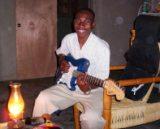
Elie has lived at his aunt’s house in Ka Glo since his mother died, in 1998. He’s the youngest of his parents four surviving children, and the older brothers live with their father down the hill in Metivye. The father is a stonemason, but he can’t work anymore because advanced glaucoma has all but blinded him. When the mother died, the family’s sense was that Elie needed a mother figure, so he was sent away. We’ve been neighbors ever since.
He had been trying to get me to go to the lake with him and his brothers for a couple of years. It never seemed to work out. But he took the second of the two high school graduation exams this year, and we all decided that he should use that as an excuse to take a break from books and chores and spend a day having fun. So he and his brothers planned a day’s excusion. Here he is with two of the brothers, Maxène and Josue:

Maxène is on the left. He’s the oldest by quite a bit. Two siblings born between him and Josue died as young children. He works for the Haitian water authority. They send a team that he’s part of around Petyonvil to open and close the pipes that determine which neighborhoods get water service when. Josue is a carpenter, a skilled cabinetmaker. The third brother, Apocalypse, is a fourth-grade teacher, and electrician, and a plumber. He was busy working the day we went to Tomazo.
We got to Tomazo midmorning. It involved bouncing from pick-up truck to bus — lots of sitting in tight spaces. The station in Tomazo is right next to the market, and it was market day there when we arrived.
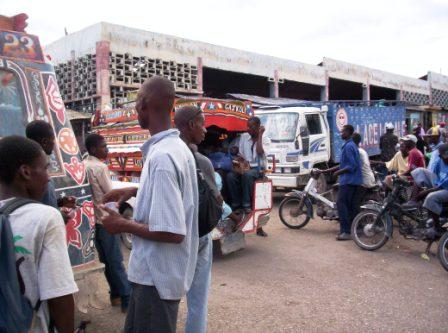
From there, we walked to a farmer’s house where fresh milk, straight from the cow that day, was waiting.
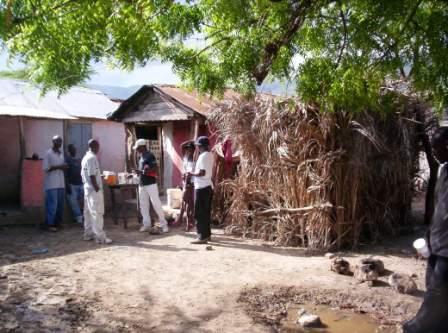
The milk had been ordered in advance, four gallons of it, served hot with sugar and cinnamin. In addition to Elie, his brothers, and me, there were a couple of his cousins from Ka Glo, my neighbor Ti Papouch, and my friend Dr. Job. There were about ten of them, guys between 14 and 37, so there was no amount of food and drink they couldnt have disposed of.
There was a nice walk from downtown Tomazo to the lake.
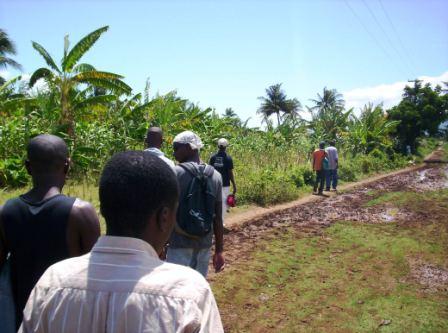
The lake is beautiful. Its very shallow, so the water is rather warm. Right next to it is a spring of fresh, ice-cold water. So you can swim all you want then rinse off. The spring water was perfectly drinkable. Here is Ti Papouch, just before changing to go for a dip.
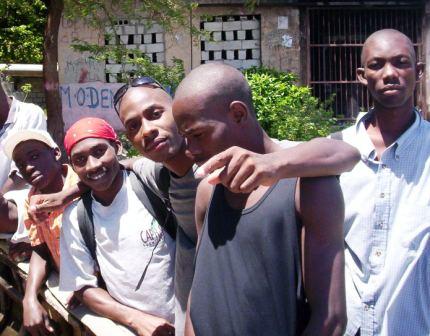
And here they are walking along the water.

Here’s Elie. He asked me to take this picture of him right at the water’s edge.
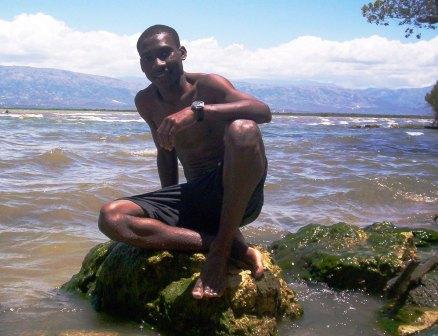
Here they are almost ready to leave.From the left, thats Ti Papouch, Elie, his cousin Lylson, Frantzcy, and Dr. Job.

After swimming our fill and then bathing in the spring, we went back to the house where we had drunk the milk that morning for an afternoon meal of beans and rice. There was fish sauce for those who were interested. From there we returned to the station to cach a bus home. Here Ti Papouch is waiting with the youngest of our band, another Elie. This other Elie is known as Elie Clebert because Clebert is his dad’s first name.
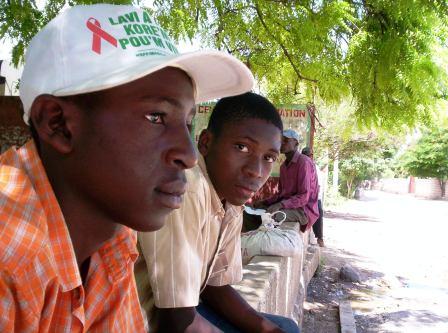
Here’s a last picture of Elie. He very much hopes that he’s passed the exam. If he has, he wants to spend the next seven years studying medicine. If not, he wants to take a course in electronics. He says that he wants to fix things: people if he can study medicine, radios if he can’t.
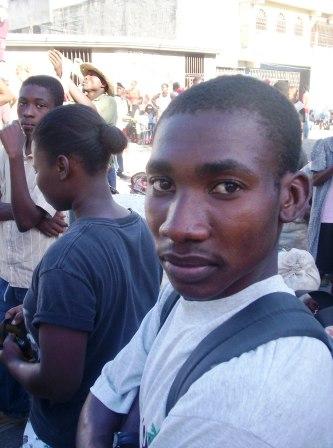
The first news I heard as I walked up the hill after a week and a half spent away was from Jhony’s father. I don’t see Flambert very often. I suppose he’s down the hill most of the time, looking for work. He hasn’t had consistent work for four years. His wife, Bebette, has been supporting him and their five children with her small business. She sells roasted and ground coffee, bread, and homemade coconut candy by the side of the road just below Kaglo.
Flambert told me that Jhony was home. This might not sound very earth-shattering, but it’s a pretty big deal. Since last November, Jhony’s been living at their church, about two hundred yards down the hill from his mother’s small house. I’ve written about Jhony before: about the surprising way he spells his name and about the reason he was living at the church. (See: InterVention.) Last fall, he got sick. His family was convinced the sickness was caused by a curse that had been placed on him, so they put him under the protection of the pastor. Several efforts I made to lead them towards seeking conventional medical treatment for Jhony got nowhere.
When my own doctor – fourth-year medical student Dr. Job – went to the church with me for a casual visit, he talked with Jhony and looked him over. By then Jhony had been sick for awhile, and the symptoms had shifted some. Job couldn’t do a full examination. The circumstances didn’t really allow one. But what he saw and what he heard led him to voice his suspicion: Some kind of blood infection had led to anemia. He could be sure, but he thought daily vitamins with iron might help. Since they couldn’t really hurt, I bought some on my next visit to the States, and Jhony’s been taking them ever since.
When I heard that Jhony was home, I went to see him right away. I also needed to pick up a can of coffee that his mother had been holding for me since before my last trip. I spoke with Bebette, and she gave me more details. Jhony’s problems turn out to have started, from her perspective, as a silly argument among kids. One of Jhony’s cousins was ridiculing him and his mother because they live with their family in an unusually small, beaten-up house. They appear to be one of the poorer families in the area. Jhony is extremely loyal to his mother, so he answered the ridicule with hard words of his own. Apparently, the cousin’s father, who is Jhony’s uncle and Bebette’s brother-in-law, took what Jhony said badly and said that he’d make Jhony pay for his words. Bebette believes that he then went to a local Voudoun practitioner and paid to have a curse placed on Jhony.
It took the most curious conversation to bring this story out. She was complaining about the way her children – delightful kids, one and all, as far as I can tell – are constantly fighting. I answered that I remember fighting with my siblings. Worse than that, I remember that, as much as I adore and admire my sister right now, there was a time when we hardly spoke with or wanted to speak with one another. That’s when Bebette started talking about her broken relation with her formerly favorite sister. They haven’t exchanged a word, not even a “good morning”, since her brother-in-law cursed Jhony. And it’s hard to describe how grave a matter withholding a “good morning” is in Haiti.
And for Jhony, living at the church for these past months was a grave matter as well. Though he seemed much better by the middle of the winter, after he had lost one full marking period of school, the pastor insisted that he could not leave the church grounds on secular business, like education. So he missed another marking period, and then another. Three out of four of the year’s marking periods. His grades for the first period had been excellent – as they have been his whole life – but the year, the eighth grade for him, was definitively lost. There was no way he could pass.
And this promised to mean more than simply losing out on a year of school. Jhony was attending the public high school down the hill in Petyonvil. The only free high school anywhere near him and, so, the only high school his mother could afford. Petyonvil’s population is something around 100,000, and there is only one public high school, so even though it is much too far away from many of the county’s residents for them to send there children there, places in the school are nonetheless hard to come by. Somehow Bebette had secured one for Jhony, but there are so many kids who can’t get into the school at all that the school’s firm rule is that students who fail a grade are out. They are left to go to private schools instead. No exceptions.
Jhony’s situation appeared lost. Bebette would not be able to pay for a private secondary school, so he seemed to have lost any chance of moving forward in school.
This is a very big deal to him and to his mother as well. Her parents didn’t believe in sending girls to school, so they didn’t send her sisters or her. She somehow got herself through first and second grade without their help – I don’t know how – but she can barely read at all since her two year’s of education was in French and it’s a language she doesn’t speak or understand. She’s been very determined that her sons and her daughters as well would be more fortunate than she was, so she’s worked very hard to keep them in school. Her oldest child, a daughter, moved down the hill to go to high school, and, without Bebette’s supervision, has gotten into all sorts of trouble, but her younger daughter and her four boys have been with her and have been in school. She’s insisted on it.
My neighbor, Mèt Anténor, has been helpful in this respect. He’s the principal of the local elementary school, and it’s there that all of Bebette’s children have gone. Unlike a lot of public school directors in Haiti, he’s inclined to view all sorts of rules loosely. Though he is forced to charge parents a small yearly fee – the government pays nothing but the teachers’ salaries – he does not insist on the fee when parents cannot pay. He’s a local resident, and he knows well enough who can pay and who cannot. Children are expected to come to school in uniforms, but children without uniforms are never sent home. Mothers and fathers like Bebette do as much as they can, and Mèt Anténor overlooks the rest.
Mèt Anténor and I were talking one day about Jhony last spring, and it turned out that he had already gotten to work. It also turned out that, rightly or wrongly, “no exceptions” depends on who asks whom. As a public school principal, Mèt Anténor has connections to the principal of the public high school. Apparently, one can ask for favors. And when Mèt Anténor personally introduced Bebette and Jhony to the school’s principal, an exception to the “no exceptions” was created. The principal remembered Jhony as a serious boy who worked had and caused no trouble, and decided to give him a chance. If he appears at school on the very first day of classes, he will be allowed to stay. He’ll be repeating the eighth grade.
It remained only to get Jhony out of the pastor’s hands and, then, to get him a new uniform – the rules at the high school are stricter than the rules Mèt Anténor applies. Bebette managed the first piece in the simplest possible way. She went to the church, announced that Jhony was going home with her, and simply took him away. She did so over the pastor’s objections. Though she credits the church and its pastor with helping Jhony back to health, and though she continues to view herself and her children as devout members of his congregation, she would not allow Jhony to continue to live in other people’s hands. She told me by way of an aside that she believed that the pastor did not want Jhony to leave because he is a very well-behaved boy who is willing to do all sorts of chores and never argues or talks back. This she was willing to say about a religious authority whom she credits with saving the boy’s life.
She’s now having he uniform made, so Jhony will be ready to go. She glowed as she told me how she finally sees that Jhony’s health has returned. He has good color and seems to be at full strength. We agreed that we wouldn’t know for certain until he starts hiking up and down the hill every day, as he will have to do when September comes. Even if he were to take a tap-tap from Malik, he’d still have a half-hour hike each way, and the sixty cents the round trip between Malik and Petyonvil would cost every day is more than Bebette can afford.